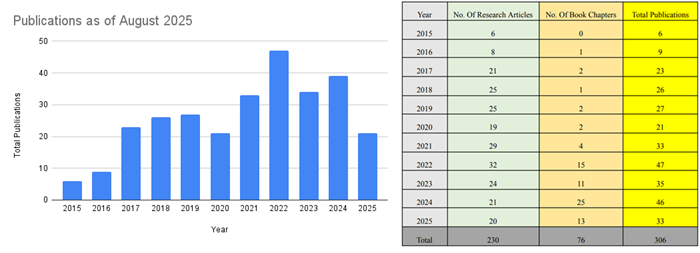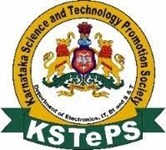Research
Funded Projects
TOTAL PROJECT AMOUNTS SANCTIONED CROSSES ₹2 CRORE 77 LAKHSThe faculty at the School of Basic and Applied Sciences has shown a strong commitment to securing externally funded projects. Since its inception, the School has successfully availed multiple grants from prestigious funding agencies such as the Science and Engineering Research Board (SERB) – Extra Mural, Core Research, and Early Career Research schemes under the Department of Science and Technology (DST), Government of India, the Anusandhan National Research Foundation (ANRF) – DST, and several grants from the Vision Group on Science and Technology (VGST), Government of Karnataka.
As of 2025, the cumulative sanctioned amount stands at ₹2.77 Crores, reflecting the School’s active engagement in high-quality research and national collaborations.
Students are continuously encouraged to take part in initial small-scale research projects, enabling them to gain valuable hands-on experience and training to contribute effectively to larger projects.

Funded Projects, Research Awards & Publications:
Funded Projects
S.No
Name of the Project
Name of the PI/Co-PI
Year of Award
Funding Agency
Funds provided ( In Lakh)
Photo
1
PLGA-based bone implant scaffolds for anti-tubercular therapy in Pott’s disease
Dr. Blessy Baby Mathew
2025
Department of Science & Technology (DST)- NIDHI
8

2
A therapeutic combination of synthetic and natural small molecules toxin inhibitors against Indian “Big Two” Viper snake venom: A preclinical efficacy study.
Dr. Vineetha MS
2025
VGST
10

3
Rheosensation in bacteria a potential tool to target Multidrug resistance
Dr. Kumar Perinbam
2025
DST-ANRF
60

4
National Conference on Innovative strategies for Advancing Biomedical Research
Dr. Vineetha MS & Dr. Pronama Biswas
2025
DST-ANRF
1.5

5
National Conference on Innovative strategies for Advancing Biomedical Research
Dr. Vineetha MS & Dr. Pronama Biswas
2025
Anderson Labs, Bengaluru
0.25

6
National Conference on Innovative strategies for Advancing Biomedical Research
Dr. Vineetha MS & Dr. Pronama Biswas
2025
KSCST, GOK
0.25

7
A five day National workshop on Recent Advances in 3D printing for Tissue Engineering Applications
Dr. S. Geetha Priya
2024
DST-ANRF
1.2

8
Standardization and validation of fluorescent polarization assay for the diagnosis of brucellosis
Dr. Triveni K Dr. Susweta D M
2022
VGST,Govt. of Karnataka
3

9
Separation of Biobutanol via Scalable Approach of Pervaporation: To be a Viable biofuel for future.
Dr. Santosh Choudhari
2019
DST-SERB
40.9

10
Investigations on intestinal neuropeptides as anticolitogenic agents on mitochondrial function for the maintenance of colon epithelial tract in ulcerative colitis.
Dr. Sunil S More Dr. Gautham S A Dr. Arpan Kumar Maiti
2017
DST-SERB
39.14

11
Isolation of Matricryptic peptides from marine industry waste involved in nanocrystal hydroxyapatite and fabrication of a peptide based osteointegrative implant coating.
Dr. Pradipta Banerjee
2017
DST-SERB
34.4

12
Immobilized microbial consortium for pesticide bioremediation in Ginger cultivated soils of Karnataka
Dr. Shobha K Jayanna
2017
KSTePS,Govt. of Karnataka
20

13
Purification and preparation of nano cocktail of active principles of folk medicinal plants as first –aid formulation for snake bite victims
Dr. Sunil More Dr. Gautham S A
2016
DST-SERB
28.53

14
Isolation of therapeutic cryptic peptides involved in blood pressure regulation from marine industry waste
Dr. Pradipta Banerjee
2015
VGST,Govt. of Karnataka
30

Research Awards
CISAR Lab : Center for Innovative Science and Advanced Research
Publication
Research Domain
Research Policies
Research Policies
School of basic and applied sciences promotes research culture among students, research scholars and faculty members of the school by providing necessary support in terms of research guidance, infrastructure, time, mental support, publication review, mentoring and research work review. To fulfill the above said motive the following research policies for the department have been framed and approved by the department for their effective implementation.
- Faculty research supervisors will be allocated to both under graduate and post graduate students according to the expertise and area of research.
- Both under graduate and post graduate students are encouraged to present their research work in a conference conducted at National or International level.
- Both under graduate and post graduate students are expected to publish their research work in a indexed journal of National or International level.
- Faculty members who pursue PhD in Dayananda Sagar University or any other recognized university will be supported to attend their Doctoral Committee Meeting or to attend course work classes by making necessary adjustments in their work load for the time required.
- Faculty members are allowed to make use of research lab, instrumentation lab, library resources and other facilities for their research work.
- Recommendation for incentives for conference presentation and publications by faculty members of the department will be made according to regulations of the University.
- Provision of research seed grant, with a ceiling of Rs. 5 lakhs per proposal thereby encouraging researchers to start off with their initial research.
- Encouragement given to researchers in the Departments to send their research proposals to external funding agencies and industries and pass on an equivalent of 8% of the sanctioned amount as incentive to Principal Investigators.
- Financial support for travel for attending conferences and organizing conferences.
- Faculty members are expected to undertake research, leading to quality publications, presentations in National/International conferences of repute, generation of Intellectual property with potential for commercialization, socially useful outcome and other similar research activity.
- The core objective is to establish a vibrant research culture among the faculty community with an interdisciplinary perspective in order to respond to the emerging challenges faced by the society at regional, national and global levels.
- Policies approved by the University for promoting research are:
- SEED MONEY GRANT POLICY
- DSU CONSULTANCY POLICY
- GUIDLINES FOR MANAGEMENT OF RESEARCH PROJECTS
MOU
S. No
Name of the Organisation/ Institution/ Industry with whom MoU is signed
Year of signing MoU
Duration of MoU
1
INVIVO Bio Sciences – Bangalore
2017-18
No limit
2
Sangene Biotech – Domlur, Bangalore
2018-19
No limit
3
Institute for Drug Delivery and Bio Medical Research (IDBR)
2018-19
5 Years
4
Intelli Education Group
2019-2020
6 months
5
Cyberjaya University of Medical Sciences, Malaysia
2019-20
5 years
6
Aimst University Malaysia
2019-20
5 years
7
Prayoga Institute of Education Research (Prayoga), Bangalore
2021-22
3 Years
8
ICAR – Indian Institute of Horticultural Research, Bangalore
2021-22
3 Years
9
TamilNadu Biodiversity Board
2022-2023
3 Years
10
ICAR-National Institute of Veterinary Epidemiology and Disease Informatics, Bangalore
2022-2023
3 Years
11
Prescience Insilico Private Limited, Bangalore
2024-26
3 Years
12
MOLECULAR CONNECTIONS, Bangalore
2024-2027
3 Years
13
OG Health care / Infosense Technologies Private Limited, Bangalore
2024-2029
5 years
14
Microbiologists Society, India
2024-2027
3 Years
15
Indegene Limited, Bengaluru
Mar-25
1 year
16
Nuvedo Labs, Bengaluru
2025-2029
5 years
17
Corrohealth Infotech India Private Limited
Mar-25
No limit









